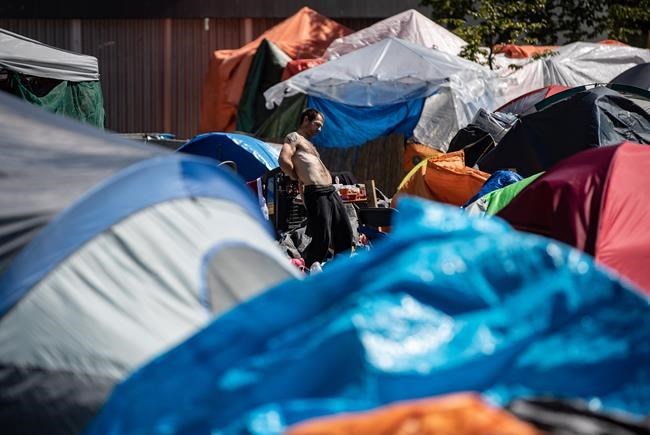The coronavirus pandemic turned the on-going work of housing homeless people into a frantic emergency effort that will have to be sustained indefinitely.
The ambitious initiative announced on the weekend has a very tight timeline. Hundreds of homeless people have to be moved off Pandora Avenue and out of Topaz Park by May 9. After that, it’s going to be a long-term effort that will need a bigger mobilization of resources. There were no cost estimates available, but it’s going to involve a huge amount of money. About $40 million was allocated in the budget pre-pandemic for homelessness.
Described as a “temporary” emergency measure, the hotel-room plan is also the start of a permanent long-term solution at the same time. Hard to imagine all those rooms being emptied and the program being wound down after the pandemic emergency eases.
Officials briefing reporters prior to the announcement said they’re targeting the interim housing options for a three- to six-month time frame. “We want to be very clear, though — it’s not our intent that people leave hotels and go back to the street. They will be transitioned into more permanent supportive housing.”
They’re also working on expanding it across B.C. The initial push is to house about 360 campers in Victoria and create room for hundreds in Vancouver, where there’s a permanent homeless camp at Oppenheimer Park. But various other communities have comparative homelessness problems, even with supportive housing in many towns.
So officials said acquisition of rooms is being pursued in other communities. They’ll be wanting just as much extra help and Social Development Minister Shane Simpson said they are not being ignored or forgotten.
The plan is ambitious in the extreme. Here’s what they are going to attempt in Victoria:
Shut down two camps of about 360 people in the space of two weeks and shuttle a few dozen people a day to new accommodation in various hotels and motels where deals have been struck. That will involve professional movers packing bins and observing all the health protocols.
Then set up the hotels with 24/7 staffing, including front desk monitoring and security, to be run while observing social distancing. All the professional counselling and medical support for addictions will be either on site or available. The former campers will be housed one to a room.
The hotels and motels will be operated by several non-profit agencies that have been preparing for the program.
All the while, they’ll be negotiating for additional spaces, including with some hotel chains whose rooms are all empty due to the pandemic.
The emergency response has obviously been in the works for weeks and the negotiations for the rooms appear to have been kept confidential. Ten days ago, Victoria council passed an emergency motion urging B.C. to requisition hotel rooms for just this purpose. Mayor Lisa Helps said they’d “hit a wall” in dealing with the problem. It’s odd that they didn’t seem to know this was coming. Public Safety Minister Mike Farnworth said his emergency order to shut down the camps was made in collaboration and co-ordination with local governments. The comprehensive plan was done in consultation with Victoria, he said.
The vast majority of homeless campers on Pandora Avenue and at Topaz Park want out, according to officials who have been doing outreach work for weeks.
The ambitious hotel-room program is voluntary, officials said. But leaving the camps is mandatory, under a public-safety order imposed during the state of emergency.
So they don’t have to move into the hotel rooms, but they do have to move out of the camps.
Officials said the camps in Victoria and Vancouver were getting so bad that health workers were withdrawing services because of safety concerns. A crime wave developed in the neighbourhood around Topaz Park within days of the city sanctioning the camp there.
Simpson said: “We are working hard to make sure that those challenges that we’ve seen at Oppenheimer and we’ve seen in Topaz and Pandora around security and safety aren’t transferred to the hotels and that will be a significant part of the mandate.”
The full-scale blitz already underway is going to need just as big a follow-up to make this work.



